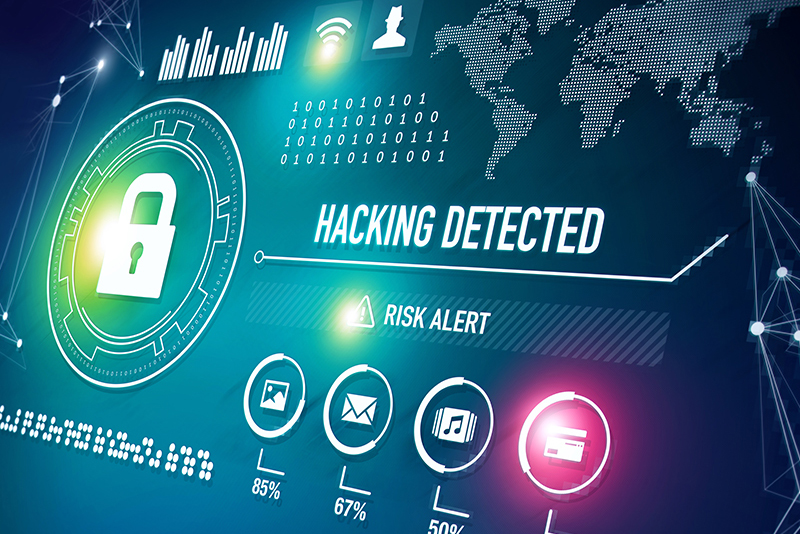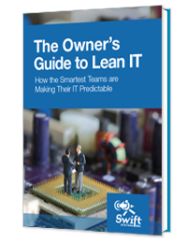
The Importance of Business IT Security
In order for your company to be as financially sound as possible, your technology infrastructure needs to run efficiently with minimal downtime. After all, if your employees are unable to work because of network issues, your business loses money. This is why business IT security is one of the most important parts of running your company.
Having the best computers, servers, cloud services solutions, and other technology for your business is great, but it becomes meaningless if your company is hit by an attack from a hacker and the technology is not properly secured.
The right security, however, is not something you should purchase from a box store. Hackers are creating increasingly sophisticated attacks, and most over-the-counter protection methods just aren’t able to handle it.
Once hackers do penetrate your network, do you have the right plan in place to fend off serious damage?
Your business can’t afford to lose employee productivity, sensitive information, or access to your company’s important files. For business IT security, you need to have the right team behind you to help protect against these attacks, and make sure any damage is minimal if an attack gets through.
Here are some things to keep in mind when looking for dedicated managed IT services team.
DIY vs. Do It the Right Way
 No matter the size of your business, cost is always going to be an issue. Keeping costs low helps everyone’s bottom line. With this in mind, some companies might decide to look for security programs, such as antivirus and malware protection, that are great for personal use, but are less effective as an answer for business IT security.
No matter the size of your business, cost is always going to be an issue. Keeping costs low helps everyone’s bottom line. With this in mind, some companies might decide to look for security programs, such as antivirus and malware protection, that are great for personal use, but are less effective as an answer for business IT security.
There are a few reasons why going the “Do It Yourself” route doesn’t work for businesses:
- Licensing: When you purchase software, you purchase a license to use that software. Most software companies have different licenses for business and personal use. The pricing is usually higher for business software because it’s more robust. As a business, you have more things that need protection – such as servers – than a typical user at home. So, buying an antivirus program that’s meant for a single user off the shelf at a box store is not the best idea for your business.
- Support: Business software usually comes with 24-hour customer support for an extended period of time. Software companies release new versions of security programs often, so the software you purchased last year might be three or four generations old. These software companies will only provide customer support for older programs for so long before they stop. With business software, you can request a longer support window, usually for an additional fee. Personal use software, though, doesn’t have the same luxury.
- Updates: All software companies release updates that help to improve their programs. In the case of antivirus software, the program is supposed to receive updates on a constant basis to make sure it has the latest virus definitions so it can continue to protect you. While some antivirus programs, and other programs like it, have ways to set up automatic downloads for the updates, things do happen. These features aren’t set up to automatically do it when you install the software. Without the most up-to-date definitions, the software doesn’t work as well. All software needs to be updated with the latest patches, definitions, and fixes, but if someone isn’t there to click on “Update” the software won’t be effective, leaving your business vulnerable to attacks.
Having a business IT security team on your side means you don’t have to worry about these issues as much. The right managed IT services company will make sure your business is using the best – and right – software, while keeping it up to date.
Protection in the Cloud
Cloud computing has become a vital part of successful business solutions. More and more businesses are using the cloud for remote work, easier access to files, and to save money. When your company doesn’t have to worry about the costs of maintaining on-site servers, it becomes a financial no-brainer.
There are concerns, though. All of your company’s files, emails, etc., are stored somewhere outside of your building. There could be a little apprehension, since you are storing all of your company’s sensitive data on someone else’s server. Not to mention the thought of hackers being able to get to the information if it’s not protected.
While these fears are understandable, the fact is using the cloud for your business is just as safe as if you had your company’s files stored at your facility. Granted, this doesn’t mean it is impervious to attack by hackers, it means your on-site servers are just as likely to get attacked as if your files were stored on the cloud.
Using the cloud for your business is just as safe as if you had your company’s files stored at your facility.
This, of course, is not extremely common outside of large corporations, but there are some things to be aware for when it comes to business IT security in the cloud.
- User-related Issues: Sharing information via the cloud has helped save companies millions of dollars over the past several years. From professional cloud applications created specifically for companies, to the use of programs such as Dropbox, Microsoft OneDrive, it’s extremely easy to share files. Therein lies the problem. According to research done by the digital forensics and security services company Stroz Friedberg, 75 percent of employees share corporate data via personal email and cloud file sharing accounts. That number jumps to 87 percent when the data is focused on the data habits of senior managers. This is frightening for one major reason – the information being shared using a personal email account or certain cloud file sharing accounts is not protected. If protections are not set up by a trusted IT services team, your business’s sensitive information can be sent anywhere, and received by anyone.
- Where are Your Business’s Files Located? Surprisingly, this is something companies either really focus on, or don’t think about at all. For those larger companies who look to store files on servers all over the world, there are many different legal issues they have to consider. For most small to medium-sized businesses, knowing where their information is being stored might not necessarily be as much of a concern – as long as everything is working. This is a mistake. The files your business trusts to store off-site are invaluable. You need to know exactly where they’re being kept and who is watching over them. It helps your business in the long run if you’re able to find cloud storage solutions close to your location. For example, if your business is located in Frederick, Maryland, having cloud servers near your business means a quicker response time, which leads to less downtime. If the cloud servers are located somewhere in another country, who knows how long it will take to get everything back online if something goes down?
Defending Against Ransomware
The sharp increase in ransomware attacks on business – both large and small – has most companies worried, and with good reason.
 In May and June of this year, respectively, the governments, hospitals, and businesses of some countries were brought down by Wannacry and Petya ransomware. Many of these institutions had to either pay the ransom to get a decryption key to decipher their files, or lose everything and start over.
In May and June of this year, respectively, the governments, hospitals, and businesses of some countries were brought down by Wannacry and Petya ransomware. Many of these institutions had to either pay the ransom to get a decryption key to decipher their files, or lose everything and start over.
The problem with these hackers – and to an even bigger extent, the victims – is that as long as money can be made off of these attacks, they will always be there. And there is money to be had.
In the case of ransomware attacks, most companies will pay the ransom to get access to their files. This is usually because the ransom isn’t an outlandish figure for most of these companies, and starting over from scratch would end up costing them a lot more in the long run. So, they give the hackers the demanded sum of bitcoin, the preferred untraceable, cryptocurrency for hackers, in return for the decryption key.
Of course, if you’re a small business, again let’s say in Frederick, you might think your company is safe. There’s a slight problem with that thinking. Hackers send attacks all over the world to companies both large and small. It doesn’t have to be ransomware. If a hacker can penetrate your security and steal any information, they can then use that info for a larger attack down the road. It could be a ransomware attack, it could just be a virus, or an attempt to steal sensitive information such as personnel files, employees’ social security numbers, banking numbers, etc.
While having up-to-date antivirus and anti-malware protection is a good start for business IT security, but having a managed IT services and EDR team that specializes in protecting your files from all virus and ransomware attacks is just a sound business strategy. The best business IT security involves having the best software to protect your company.
 Sophos Intercept X – When you want to protect your company from ransomware attacks, Intercept X is the go-to program. Intercept X prevents ransomware from encrypting your business’s data, even if the ransomware looks like it’s a trusted file or process. Once ransomware is intercepted, the featured CryptoGuard reverts your company’s files back to its safe states. Instead of examining hundreds of millions of known malware samples, Intercept X focuses on the relatively small collection of techniques used to spread malware. This way, it can ward off zero-day attacks without having even seen them first. Finding the right managed IT services company who offers this protection for your business should be a priority.
Sophos Intercept X – When you want to protect your company from ransomware attacks, Intercept X is the go-to program. Intercept X prevents ransomware from encrypting your business’s data, even if the ransomware looks like it’s a trusted file or process. Once ransomware is intercepted, the featured CryptoGuard reverts your company’s files back to its safe states. Instead of examining hundreds of millions of known malware samples, Intercept X focuses on the relatively small collection of techniques used to spread malware. This way, it can ward off zero-day attacks without having even seen them first. Finding the right managed IT services company who offers this protection for your business should be a priority.
Keeping Downtime to a Minimum
Downtime for your business kills productivity and is a major drain on finances. When computers, servers, printers, etc., are functioning at peak efficiency, your company should run like a well-oiled machine. If your employees can’t access the server to get the files they need to do their job, each minute that passes is more money wasted.
When it comes to business IT security, any attack by a hacker on your servers could result in significant downtime for your company. If it’s a virus, it might take a decent amount of time to wipe the virus and get everything back up and running. If it’s ransomware, well, your business might be down for fairly lengthy amount of time as you decide whether to pay the ransom (which you absolutely should NOT do) or completely wipe the infected server and install everything from scratch. Either way, your business is facing downtime, and you’ll end up paying for the downtime as well as the cost to fix the damage done by the attack.
By bringing in a great managed IT services company, the amount of downtime your business will face is next to zero. There are two reasons why this type of business IT security is the best way to greatly minimize downtime.
- Protection BEFORE You Need It: Having several layers of security helps protect your files from just about any attack. From enhanced firewalls, blacklists, state-of-the-art security programs, and more, all of your files are protected, so you shouldn’t have to worry about downtime due to a security breach. This proactive approach focuses on keeping all software up to date, as well as making sure that, in the event of an attack, the defenses are maintaining the integrity of your sensitive and valuable files.
- Protection AS You Need It: Unfortunately, it doesn’t matter how many protective measures you have in place, there will be times when hackers will manage to get access to your files. Whether they plan on stealing information, installing a virus, or uploaded ransomware, if hackers really want to break into a server – doesn’t matter if it’s a cloud server off-site or servers inside of your building – eventually, they will. This is where a great managed IT services company takes quick action. Once a hacker has breached the security, the IT team is immediately notified that an attack is taking place. At this point, they can see where it’s happening and shut it down quickly. If the hackers managed to install a virus or ransomware, the IT team can use backups (which a good managed IT services company will create at all times as part of business IT security) to quickly fix any damage that has been done.
For Business IT Security You Can Trust, Speak with the Experts
It’s understandable, at some point, a decision has to be made about how much business IT security will cost your company. After all, your company does have a budget, and keeping costs low for the cost of production is a serious priority for your company.
Although some managed IT services companies, such as Swift Systems, sit down with you and work with your business’s budget, you have to ask yourself this question: Which is more expensive – the cost of proactive maintenance, or the cost of all the downtime, loss of files to ransomware, and having to remove nasty viruses and other malware from your system?
Swift Systems, the premier managed IT services company in Maryland, has worked with business’s just like yours for almost two decades. Swift Systems is dedicated to proactive support before reactive support becomes necessary. And since they’re local, Swift Systems sends out their experts to your facility frequently just to make sure everything is running smoothly.
For the absolute best in business IT security, contact Swift Systems today – or call 301-682-5100 – to see how they can help your business

IT systems are foundational to modern businesses. Too often, that foundation is unsteady. Unpredictable outages, insecure networks, and unreliable performance from mission-critical systems can jeopardize your entire business.
There’s a better way. Learn how.
Get in touch with us for a free consultation with one of our technical experts. We’ll review your current systems, assess your needs, and identify the coverage options to best meet them.
Get in touch with us by phone:

